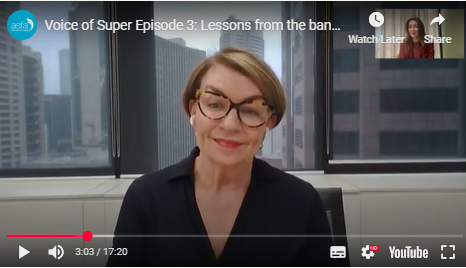In an insightful conversation with ASFA CEO Mary Delahunty on ASFA’s Voice of Super podcast, outgoing Australian Banking Association CEO and former Queensland Premier Anna Bligh reflects on eight transformative years in banking and offers some valuable insights for the superannuation sector.
Trust: the fragile foundation of financial services
“Trust arrives on a tortoise and leaves on a galloping horse,” says Anna Bligh, capturing the delicate nature of public confidence in financial institutions. Her tenure at the ABA began in turbulent times, with the banking sector under intense scrutiny and facing a Royal Commission. What followed was a period of reckoning, reform, and rebuilding.
Bligh’s reflections on trust are particularly resonant for superannuation professionals and she outlines three critical dimensions:
- Prudential trust: Confidence that funds will be safe and available when needed.
- Information trust: Assurance that personal and financial data is secure.
- Conduct trust: Belief that institutions will act in members’ best interests, especially in times of need.
While banks weathered the storm without losing prudential or information trust, it was conduct trust that suffered most. Bligh warns that super funds must remain vigilant across all three dimensions, especially given the compulsory nature of superannuation.
Actions speak louder: Rebuilding reputation post-crisis
Bligh emphasises that rebuilding trust requires more than words. It demands visible, meaningful change. Following the Royal Commission, the ABA rewrote its Banking Code of Practice and launched a national campaign to communicate reform.
“You can’t communicate your way out of a problem you behaved your way into,” she notes. And as one of the major bank CEO’s said when asked about lessons learnt, “Don’t judge me by what I say, judge me by my actions.” This became a guiding principle across the sector, reinforcing the idea that meaningful change must be demonstrated, not just declared.
For superannuation funds, this is a powerful reminder: transparency, accountability, and proactive reform are essential.
She says industry associations play a key role in their unique position to acknowledge any industry missteps and committing to genuine improvement.
Digital disruption: accelerated by crisis
COVID-19 didn’t just create digital disruption, it turbocharged it! Bligh recounts how banking trends already underway were dramatically accelerated, with mobile wallet usage skyrocketing by over 8,000% in just 18 months.
The implications for superannuation are clear. Members now expect:
- Instant access to their accounts
- User-friendly digital platforms
- Real-time responsiveness
Bligh recounts a recent positive experience logging into her own superannuation account, noting how pleasantly surprised she was by the ease and clarity of the digital interface. The site was intuitive, her password worked seamlessly, and she could quickly access her balance and account details. As member expectations continue to rise, especially among younger tech-savvy Australians, investment in technology by both funds and banks is essential – not just for convenience, but for safety and long-term trust.
Cybersecurity: a growing threat to member confidence
With vast reserves and sensitive data, both banking and superannuation sectors are prime targets for cybercrime. Bligh reveals that major banks repel millions of attacks daily, supported by large, round-the-clock fraud teams.
Super funds must match this vigilance. As members shift to digital engagement, expectations for security rise. Bligh urges caution: “Be careful not to trade off safety for speed.”
A legacy of leadership, and a call to action
As Anna Bligh steps away from her role at the ABA, her reflections offer a roadmap for superannuation leaders navigating trust, disruption, and digital transformation. Her message is clear: the sector must act decisively, communicate transparently, and invest wisely to meet the evolving needs of Australians.
To hear the full conversation and gain deeper insights into further parallels between banking and superannuation, tune in to the latest episode of Voice of Super podcast.




































